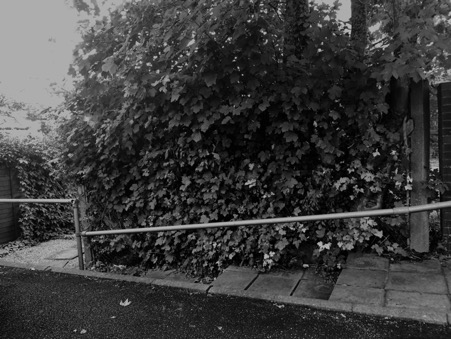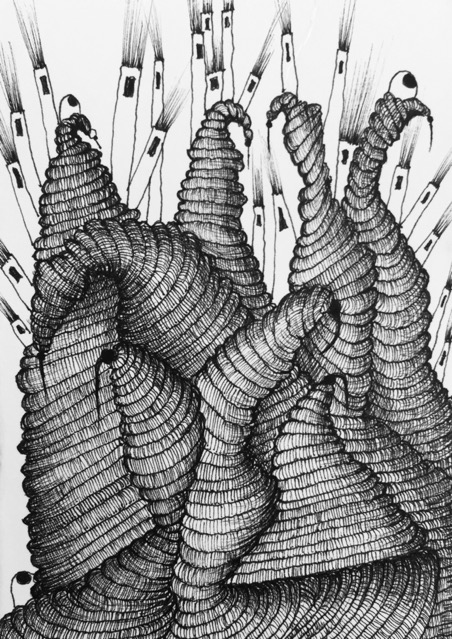# in which space & time are discovered to be deeply inconvenient.
I became a carer because of T. Or, to be more precise, because of T’s location relative to my mother’s location. His cottage could only be reached (after a 10 minute car journey) by walking down 3 steps, walking along a pebble footpath punctuated by concrete stepping stones (constituting a pretty pathway, I suppose), down another 3 steps, up another two once you had arrived at the (usually open) front door, around a corner into the kitchen, & then through, down another little step, into the circular conservatory.
It was not a journey my mother could manage alone.
But perhaps I mean I became a carer not just because of the relative locations between T & my mother (neither of whom were moving anytime soon), but because of my location relative to the both of them. However you examined the conundrum, my habitual spatial co-ordinates on the planet were a good deal more removed from the relatively, albeit taxing, distance between my mother & T. There was, to put it mildly, a lot of space (& therefore time, it seems) between me & my mum.
So perhaps this means I became a carer because of triangulation. I choose this word because of its closeness to the word strangulation. But having done a bit more reading, I realise there might be many better nouns. But for now, I am sticking with it. I remember coming across the word when reading a book about Mercator. Even then I did not understand the properties of triangles, & I am a bit shocked (maybe with a wry, raising of the eyebrows kind of emotion) to discover that triangulation has a completely different meaning in psychology, to do with a toxic relationship between 3 persons.
And although this may seem a touch abstract, & irrelevant to the 3 bodies involved in this part of the story, this stuff does seem to form part of the fabric of the reasons I became a carer, which I am trying to collate & understand.
It seems to me ridiculous to suggest that my decision (I deliberately introduce this intention-laden word here) to become a carer has anything to do with the huge & ancient & modern scholarship about the nature of space & time.
But still, I am interested. I am flabbergasted to learn that so much discourse was generated about spinning buckets containing water. I am discomforted by the fact (if that is what is) that space is no longer considered a container. But I am not surprised to learn that a body such a mine causes a material space to curve around it. After all, it seems to me that were I not in existence, the space would fill the space where I am no longer, & my body is hardly geometrical.
I remember, for instance, screaming at a cold dark night sky, when my brother died. Where. Are. You. Now. Pete.
And I came to realise that not one of those words made sense when speaking of the dead. We do not, not at all, have a language for the dead. They can’t tell us either, & that seems to be the nature of things (if things is the right word), as Marilynne Robinson noted. (1)
My brother may not be interrupting the spatial stuff of curves & the sort-of-maybe indecisive particles of which he was a part, any longer, but my mother certainly was, albeit slowly. Or, I mean, I think, more slowly than many. (Though I leave out the plant kingdom, naturally, where slowness seems to help a lot, but it would not be helpful to contrast my mother’s difficulty with moving to those tiny motions of a birch, or an oak). It took me 25.37 seconds to move from the car & into T’s cottage. It still does, more or less. But for my mother, with my help, (her left arm hooked into my elbow, her right supported by a stick) it took us about 10 minutes. As time went by it took us longer, & longer. Towards the end the terrain had to be traversed using a wheelchair. So time speeded up, but not in the sense that things got easier.
Getting back out of the cottage was a lot more difficult than getting in. I did not have the strength to pull the wheelchair up over steps. Down, albeit bumpy, was possible. Which is, I suppose, something to do with the gravity the physicists are so interested in. Whatever it’s curious nature, I was experiencing the practicalities of its effects every Saturday.
So, I return to the conundrum. I became a carer because of T, & I tried to explain this by considering space & time. These are, after all, supposed to be fundamental to our understanding of the nature of things. I could also have added in the nature of the terrain, the topography, I suppose, of that journey. Certainly, it seems to me, space & time had something to do, in an explanatory way, with how I wanted to unpack the sentence, I became a carer because of T. It is difficult, but these concepts, or do I mean practicalities, were the first to come into my head. I don’t know why.
I think space & time can only be part of the story.
2.
# in which the particularities of the human body come into consideration
I could not have become a carer, because of T, were it not for some particular neurochemistry in my own head. It is still the case, it seems to me, that I became a carer because of T.
But the causation here is not clear. To have helped my mother across the terrain to T’s cottage, given how far away I habitually lived, at the frequency with which she demanded, required a set of improbable albeit actual circumstances to have been the case. I will try to explain.
A lot of stuff goes on in our heads, as neuroscientists are very keen to point out. And a lot of stuff, given contemporary mapping techniques, goes on in our heads at particularly intricate places & times. So, mapping in space & time, it
seems, all over again, but restricted to some stuff in our heads. That is quite a small space, or should I say lack of space, given the lack of room in there, filled as it is with neural tissue & blood & other critical matter for the functioning of the brain. I have read that this object in our skulls is the most complicated thing (if that is the word) in the known universe.
So, when you think about it, all explanations, whether about my mother or T or myself, should stem from here, even when extricating the facts about why I became a carer, because of T. Well I have said it was because of T. But I am examining causation. Maybe I am wrong, & the nice sentence does not convey the truth of the matter.
And then I am onto another question, given my ruminations about space. Are there spaces in our body, or are they full of this ludicrously intricate stuff, with no gaps at all.
But I digress, as usual, it seems. This, I think, is irrelevant.
But no, some part of my brain is not irrelevant to this investigation.
I do not even now know what part of my brain was involved in this. I will leave that to the experts. But some time before it became apparent that my mother could not manage the journey to T’s alone, I had become ill. Or, to put it slightly more succinctly, I was informed that I was unwell. My brain had become infected (I suppose this much was agreed upon, although our languages differed in the specifics). I could describe, in much detail, what I thought was going on, but the bottom line seemed to be that my head contained too much dopamine, & not enough serotonin. I seem to remember that I have drawn a picture of the dopamine molecule, but how that helps, I don’t know. A image of a neurotransmitter does not convey much information, at least in the way this supposed excess affected my life. At any rate, whether it was this florid surplus of a molecule I had never heard of, or the effects on my body that other, perhaps more complicated molecules, designed to stop the former docking, as it were, in my head, well whatever the causation, I could no longer work, in that normal sense we associate with labour & the money we get for doing it.
It was not as if I was doing nothing. During my long holidays in hospital ( I use the word holiday not because it was fun, & planned, but because it became a complete excision from the normal world, in the way that some think that travelling to a completely different set of spatial-temporal co-ordinates is enjoyable, provided they can get back, of course), I started doodling. It calmed me down, &, on balance, I was not calm about the turn of events at all. The results were visual, not textual. The analytical side of stuff was no longer a part of me, after all. So, I was not doing nothing. But, on the other hand, I was, in effect, in normal parlance, doing nothing.
So, one way of accounting for the way things turned out would be to say I became a carer, not because of T, but because of D, that molecule in the head.
But, nonetheless, I don’t think that explanation quite does it, for me. That excess of a molecule may have enabled me to become a carer, but I don’t think that was the cause. Were it not for T, I would have had to become a carer, dopamine excess or not.
These reflections have gone on enough. I became a carer because of T. This seems to sum it up. But let me add a footnote into the body of this text.
I came down from the city, full of ideas & my understanding of practicalities. You can’t do this anymore, mother, I said. There are other obvious solutions. Yes, she sort of said but didn’t really. So we arranged for the final visit to T. In his kitchen, she said to him ( with me steadying her with my arm):
“Thank you for all your hairdressing, Tudor”.
She had tears in her eyes.
That is why I became a carer.
(1) In Gilead, the father, writing the letter to his son, tells him that by the time he reads this, he will be gone a long time: “I’ll know most of what there is to know about being dead, but I’ll probably keep it to myself. That seems to be the way of things”. I just so fervently wish the dead had a postcode.











